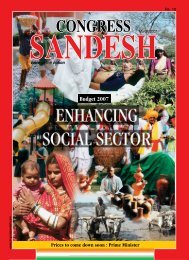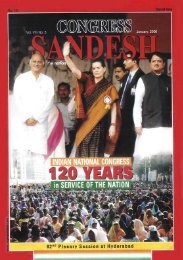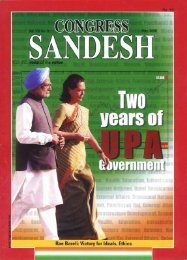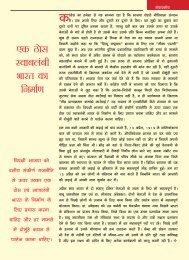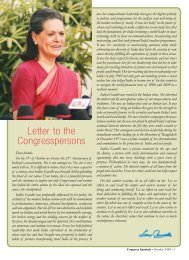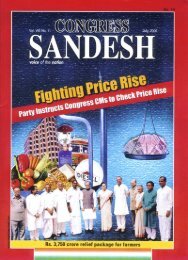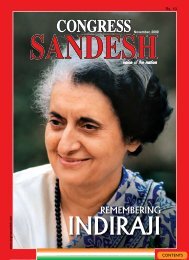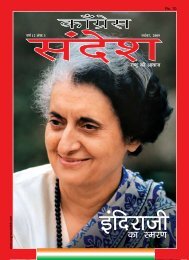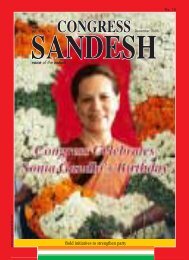CONGRESS SANDESH COMPLETES ITS SEVEN YEAR
CONGRESS SANDESH COMPLETES ITS SEVEN YEAR
CONGRESS SANDESH COMPLETES ITS SEVEN YEAR
- No tags were found...
You also want an ePaper? Increase the reach of your titles
YUMPU automatically turns print PDFs into web optimized ePapers that Google loves.
Terror Struck AgainThe timing of the latest terrorist attack in the heart of Londonto coincide with the G-8 + 5 summit, being held atGleaneagles in Scotland was definitely not a coincidence. Itwas designed to show the world’s most powerful nations howvulnerable they are and how helpless. Once again, ithighlighted the need for united action amongst the countriesof the world, a cooperative war not unilateral decisions. PrimeMinister Manmohan Singh quite rightly pointed out that Indiahas been facing terrorism for the past twenty five years andjust a few days before the attacks in London six terroristswere shot down in Ayodhya.The G-8, like India, faces two major issues today. Terrorismand Trade. And both are a questions of ideology. These aretied to, on the one hand ideologies, that believe in democracyand constitutionally, legally given freedoms and others thatbelieve in a one over generalizing ideology of faith, ofrevolution as the only correct way. One society is exclusive,the other inclusive and broad based. Open societies workwith the large participation of civil society and where everybody has a right to express their differences, in religion,colour and language but peacefully. The other is ideologiesthat create and constantly find enemies. Ideologies offanaticism where violence is justified and legitimized. TheJehadi Islam of today, the VHP and the RSS for example orthose who take to the ‘revolutionary ideology’ of the Naxalsin India and the Maoist in Nepal, the LTTE in Sri Lanka. Theseare ideologies that see no harm in using human shields ortargeting civilians, they are terrorist and totalitarian ideologiesand organizations.Yet, although nothing justifies violence, these ideologies donot come up in a vacuum. They also reflect the aspirationsof the disenfranchised. We all accept today that the war inIraq was unjustified. American and British public opinionaccepts it. Thousands of innocent Iraqi civilians have died.President Bush and Tony Blair have to answer why they wentto war with Iraq, why instead of finishing the roots of Al Qaedain Afghanistan and its networks in Pakistan it decided to chasea lie. There were no weapons of mass destruction in Iraq andinstead of Democracy, more people have died in Iraq since␣␣EditorialSaddam was captured than when he was alive. For educatedyouth with European citizenships, the targeting of Iraq wasseen as the targeting of Islam. Will civil society and opensocieties be forced to change as the enemies materializewithin? If open societies are to survive, then the war onterrorism internally and externally, it has to be fought in unityand preferably under the leadership of the United Nations.The war on terrorism must also examine and solve the issuesthat create terrorism.The other issue facing both India and the G-8 countries areissues of trade and protectionism. The ‘No’ to the EuropeanUnion Constitution in France and the Netherlands is also seenas a vote against globalisation and further integration. Todaythere is massive dissension within the European Union onthe nature of subsidies with England arguing for an end toan internal European subsidies where forty percent is givento agriculture and that to large farmers growing crops thatcan be produced cheaply in the third world. India hasconsistently advocated the doing away with agriculturalsubsidies in the west. The G-8 cannot ask us to open up ourmarkets and then follow protectionist measures where theirown economies are concerned. We, in the third world, needtrade and fair trade practices, not aid or charity.And within our country we need economic reform to continuewithout it being held ransom to populism. The Congress Partyhas always had the interests of all its people and all itsgenerations at heart. Like our Petroleum Minister, Mr. ManiShanker Aiyar argued in his plea to hike the rates of fuel, “Tosatisfy one generation should we sacrifice the next?” Longterm planning and generational planning is necessary if Indiais to change its mindset. Old ideologies and their shibbolethsare not an answer. We need open minded people who respectan open society and who can assess India’s national interestover the next decade. People within the party willing to moveahead, taking the best from our democratic institutions andour capacity to gain from the global integration of markets.The Congress believes it can look for new ways to achieveequality and justice through constitutional and peacefulmeans. ❖4Congress SandeshJuly, 2005




